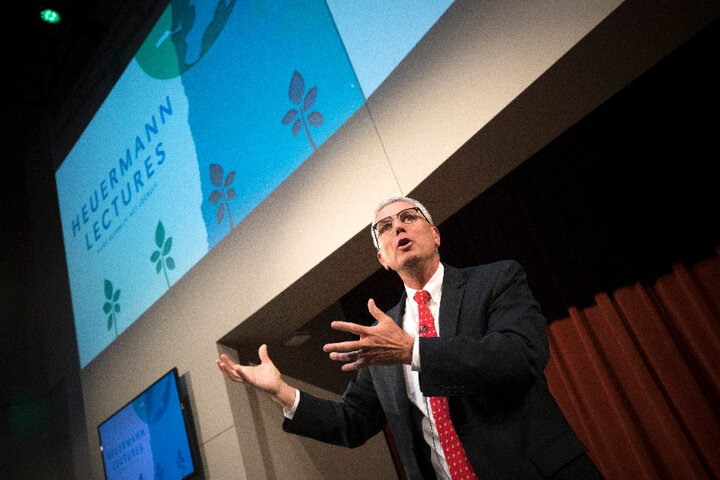According to Donnie Smith, it's time for the agricultural industry to take back the story of food production.

Missed the Lecture? View it online.
Smith delivered the second Heuermann Lecture of the 2017-18 season Jan. 9 at Nebraska Innovation Campus.
Smith was president and CEO of Tyson Foods from 2009 to 2016 and continues to serve the company as a consultant while focusing on his work to feed the world. He said he believes consumers are being told fictional stories about modern agriculture, which is leading to mass fear of the food system.
"There's a story being told in America, and frankly around the world, today about agriculture and what we do," Smith said. "It's largely fictional, based on partial truth, but Americans are buying it hook, line and sinker."
These fictional stories are being told as the agricultural industry is seeing major achievements – such as baby boomers doubling food production in their generation – while still facing tremendous challenges, Smith said. Today's generation must find a way to double the amount of food the baby boomers produced using the same amount of land, air and water. They'll also have to do so with additional pressures on the food system, such as increased life expectancy and increased incomes, both of which lead to people eating more food.
"Why isn't our noble effort in agriculture to feed this world, front-page news?" Smith asked.
He is no stranger to the challenges facing the food system. During his 36-year career with Tyson, he worked to learn every angle of the business. As an executive, he led the company to focus on feeding the world high-quality, affordable food.
Smith said the challenge of telling the true story of agriculture is that producers simply don't have the time. They spend considerable time making, processing, marketing and delivering food, so they don't have time to blog or post on social media.
"If we’re not telling the real story, the only story on the air is not true," he said. "That’s a huge problem and also a huge opportunity."
Smith is a proud supporter of America's land-grant system and believes the solution to the communication problem could be found at land-grant universities such as the University of Nebraska-Lincoln. Every day, university researchers are figuring out solutions, while extension professionals show producers how to implement those solutions, and the solutions become sustainable when the next generation is taught how to implement them. Smith said communication is just as important as these three missions.
"I think now, in our land-grant community, we're leaving out a new task that we've got to add to our repertoire," he said. "We've got to start prioritizing how to communicate what we're doing, and how we're doing it, and why that is so important."
Smith plans to dedicate the rest of his life to this effort, and to developing sustainable agriculture on the global scale.
One way he is doing that is through the Smith Center for International Sustainable Agriculture at the University of Tennessee. The center aims to develop science-based agricultural solutions to meet sustainable development challenges in less economically developed countries, such as Rwanda. Smith praised Nebraska for its efforts in this region, specifically naming the Undergraduate Scholarship Program in the College of Agricultural Sciences and Natural Resources. Through this program, students from Rwanda are pursuing a bachelor of science degree in integrated science, with a focus on conservation agriculture, entrepreneurship, leadership and innovative thinking. These align with the areas of need identified by the Rwandan Ministry of Agriculture and Animal Resources.
"I cannot applaud you enough for what you're doing in Rwanda," Smith said. "It's critical to the development of the capacity for that nation and all of sub-Saharan Africa to be able to thrive through all of the changes that are going to happen in these kids' careers."
The theme for the seventh year of Heuermann Lectures is "Think Globally, Act Locally." The lectures are funded by a gift from B. Keith and Norma Heuermann of Phillips. The Heuermanns are longtime university supporters with a strong commitment to Nebraska's production agriculture, natural resources, rural areas and people.
Lectures are streamed live at http://heuermannlectures.unl.edu/ and are available online afterward. They also are later broadcast on NET2.
